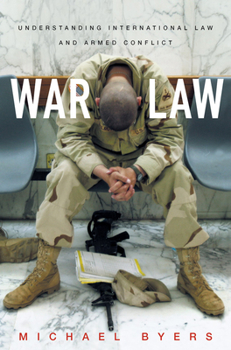War Law: Understanding International Law and Armed Conflict
Select Format
Select Condition 
Book Overview
International law governing the use of military force has been the subject of intense public debate. Under what conditions is it appropriate, or necessary, for a country to use force when diplomacy has failed? Michael Byers, a widely known world expert on international law, weighs these issues in War Law.
Byers examines the history of armed conflict and international law through a series of case studies of past conflicts, ranging from the 1837...
Format:Paperback
Language:English
ISBN:080214294X
ISBN13:9780802142948
Release Date:March 2007
Publisher:Grove Press
Length:224 Pages
Weight:0.60 lbs.
Dimensions:0.6" x 5.4" x 8.2"
Customer Reviews
1 rating
Useful study of the laws of war in relation to recent conflicts
Published by Thriftbooks.com User , 18 years ago
In this book, Dr. Michael Byers, who holds a Canada Research Chair (Tier 1) in Global Politics and International Law at the University of British Columbia, looks at aspects of the international laws of war, particularly in relation to the US-British wars against Yugoslavia and Iraq. In Part 1, he examines the United Nations Security Council's role in matters of recourse to force. Part 2 reviews the claim of self-defence, Part 3 the notion of humanitarian intervention, and Part 4 the laws on the conduct of armed conflict and war crimes courts. An Epilogue discusses current US policies. As the International Court of Justice stated in 1986 when it found the US state guilty of attacking Nicaragua, "instances of State conduct inconsistent with a given rule should generally be treated as breaches of that rule, not as indications of the recognition of a new rule." So Byers concludes, "The Kosovo war was neither consistent with international law nor effective in changing the law in favour of a right of unilateral humanitarian intervention." Byers points out that Blair spoke of `community' when he tried to justify attacking Yugoslavia, but in fact his actions obeyed only "the international law of the crusaders and conquistadors - which, in essence, was no law at all." Byers sums up that there is no right to intervene in nations' internal affairs on humanitarian grounds: "pro-democratic intervention remains prohibited under international law." Nor was the attack on Iraq legal. Byers contradicts those who argue that the UN retrospectively sanctioned the US-British attack on Iraq. "Resolution 1483 on Iraq, adopted in May 2003, was worded very tightly in order to leave little room for arguments that it provided retroactive authorization for the war. The same is true of Resolution 1511, adopted in October 2003 ..." International law during armed conflict obliges armed forces to protect civilians and prisoners of war. Byers describes as war crimes the US assaults on the city of Fallujah, its refusal to do `body counts' (breaching Article 16 of the First Geneva Convention), and its torture and killings of POWs. He argues that pre-emptive acts of war are illegal: Bush's `dangerously destabilizing doctrine of pre-emptive war' provokes wars and terrorism rather than preventing them. Byers cites the UN Secretary General's High Level Panel on Threats, Challenges and Change, which stated in December 2004, "in a world full of perceived potential threats, the risk to the global order and the norm of non-intervention on which it continues to be based is simply too great for the legality of unilateral preventive action, as distinct from collectively endorsed action, to be accepted."





